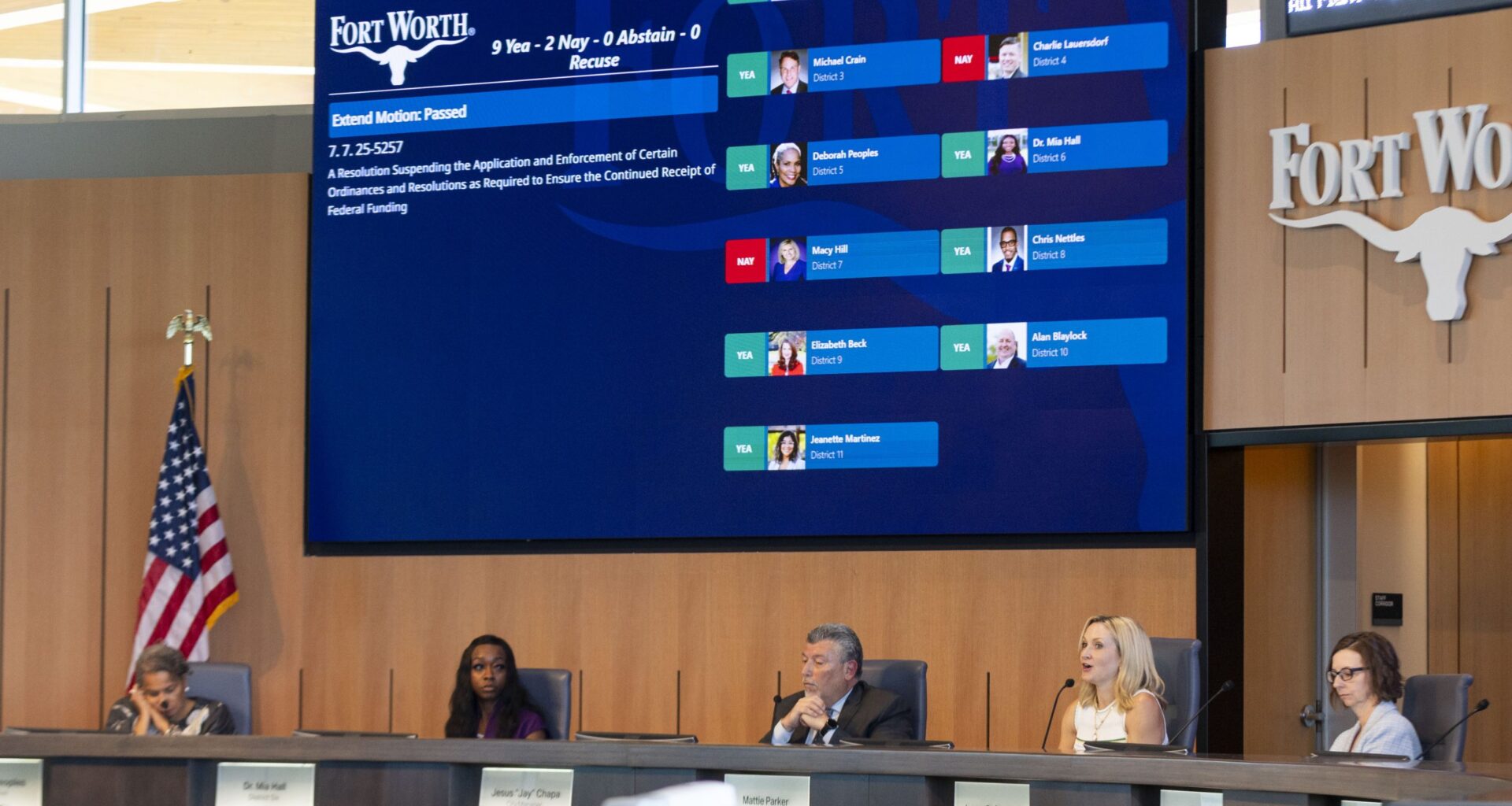Fort Worth’s diversity and inclusion department is not closed just yet.
After more than two hours of discussion, City Council members voted 9-2 on June 24 to delay voting on a resolution to suspend the department and other initiatives specifically designed to boost minority- and women-owned businesses.
City staff said a vote to adopt the resolution would have made Fort Worth comply with President Donald Trump’s executive order to end DEI initiatives in local government or risk losing federal financial assistance.
Council members Charlie Lauersdorf and Macy Hill voted against delaying the vote, with Lauersdorf saying he felt it was not fiscally responsible to keep minority-business incentives, even though diversity is “the right thing.” Hill did not speak publicly about the resolution during the meeting.
Council member Chris Nettles moved to push the decision to a later date, saying he wasn’t comfortable with ending the minority-owned business incentives without seeing concrete plans in place to continue aiding small businesses.
The council is scheduled to vote next on the resolution Aug. 5, unless council members call a special meeting in July, when they’re scheduled to be on summer break.
Before voting, council members discussed partisanship, the merit of DEI initiatives and the impact voting on the resolution — in favor or against — would have on the city’s relationships with communities of color.
Nettles said it was important that the council take a stand against the Trump administration and stand up for Fort Worth and its residents, particularly those of marginalized identities.
About a dozen community members and business leaders spoke in opposition to the resolution’s adoption, while one spoke in favor.
“When you guys leave this dais at whatever time it is, what will you be known for?” Nettles said, addressing his colleagues before their vote to delay the resolution. “Will you be known for eating the crumbs off of Trump’s table, or will you be known for standing up to a bully and saying, ‘Today is the last day that you are going to put us up against a wall.’”
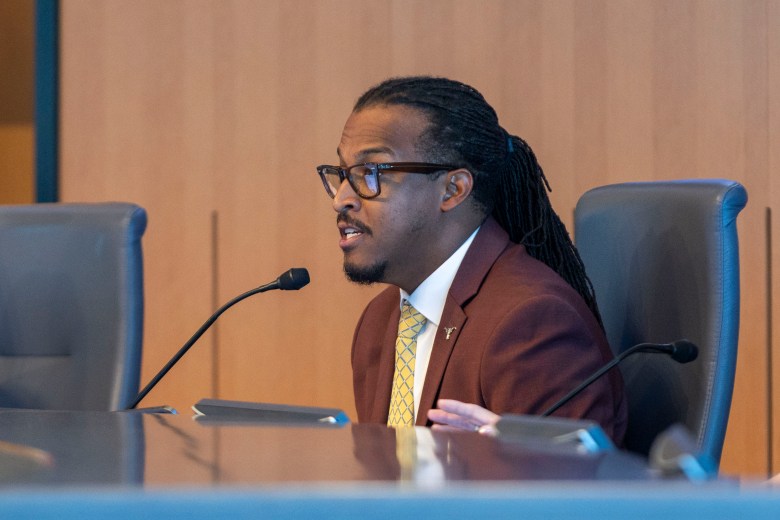 Fort Worth City Council member Chris Nettles speaks during a city council meeting June 24, 2025, at City Hall. (Mary Abby Goss | Fort Worth Report)
Fort Worth City Council member Chris Nettles speaks during a city council meeting June 24, 2025, at City Hall. (Mary Abby Goss | Fort Worth Report)
City’s DEI programs put federal funds at risk
If council does not adopt the resolution, Fort Worth risks losing $277.1 million in multiyear awards from the federal government, according to a June 17 staff presentation. The grants fund a range of departments including law enforcement, environmental services, housing and utility assistance.
Council member Mia Hall asked City Manager Jay Chapa when the city was notified that it would have to make changes to its DEI initiatives to continue receiving federal funding, questioning why the council was rushed to make a “difficult decision” before going on summer break.
Chapa said he doesn’t know if the city received any direct notification from the federal government, adding that it was uncertain for several months whether communities would have to comply with Trump’s executive orders. He said city leadership began getting information from various departments in May, at which point the council met to discuss federal funding in an executive session meeting. Executive sessions are closed meetings where council members and city management may discuss legally sensitive matters.
Chapa said he plans to create new, broader economic incentives under a “small-business development program,” to soften the blow to minority-owned businesses.
Assistant City Manager Dana Burghdoff told council the program would work alongside the city’s Black and Hispanic chambers of commerce and break large projects down into smaller-scale packages that small businesses could take part in.
While receptive to the concept, council members were wary about how long it would take to realistically create and implement a new program, arguing that even a temporary break in small-business assistance would hurt minority-owned businesses.
Council members in opposition of the resolution’s adoption said they would be open to voting in support if they could see concrete plans from city management on how to continue supporting small businesses while in compliance with federal orders.
Chapa expressed hesitancy that staff would be able to create a concrete plan including stakeholder input in time for August, noting that whether the resolution gets adopted will impact how he and staff prepare a draft of the city’s upcoming budget. Under the city’s charter, he has a deadline of Aug. 15 to present a proposed financial plan for the city’s fiscal year 2026 budget, which extends from October 2025 to September 2026.
“I need to present one balanced budget, and I don’t know whether or not I need to take into consideration that federal funds are not going to be part of the mix, and what that budget might look like, or (that) federal funds will be part of that mix,” Chapa said.
Council member Elizabeth Beck challenged Chapa to work with council members, city staff and community stakeholders to create a plan that can convince her and other council members to adopt the resolution. If he can do that, she added, the council has indicated it will support the resolution’s adoption.
“I think, honestly, the biggest factor is you,” Beck said to Chapa. “I think it’s simply just a red herring, something to throw off, that you want to take the vote today and dismantle DEI — to hide behind that budget when we’ve heard so many of our colleagues say that they’re comfortable (but) only with a plan in place.”
If the council votes to close the diversity and inclusion department, the city would still continue the department’s civil rights enforcement programs, which include fair housing and accessibility assessments and are federally protected.
As it stands, Fort Worth’s diversity and inclusion department manages the city’s business equity programs and civil rights enforcement. It also oversees three council-appointed advisory bodies — the Human Relations Commission, Mayor’s Committee on Persons with Disabilities and Business Equity Advisory Board — as well as an employee diversity and inclusion committee. City staff have not explicitly said what impact the department’s suspension would have on those commissions.
Council hashes out disagreements over dais
While City Council positions are technically nonpartisan, the motion to delay the vote was most vocally supported by five of the council’s Democrats: Nettles, Peoples, Hall, Beck and Jeanette Martinez.
Lauersdorf, a Republican, said he sees diversity across Fort Worth’s staff, specifically noting the diversity of the city manager’s office.
“I think we’re doing the right things when it comes to diversity and city leadership. … I don’t think we need an ordinance to tell us to do the right things,” Lauersdorf said. “I think that we will continue to see the city move forward and still give small businesses the opportunities they deserve.”
He questioned how the city would make up the hundreds of millions it stands to lose without financially gutting other programs, and called it “virtue signaling at its best” to ask city staff to figure out a solution.
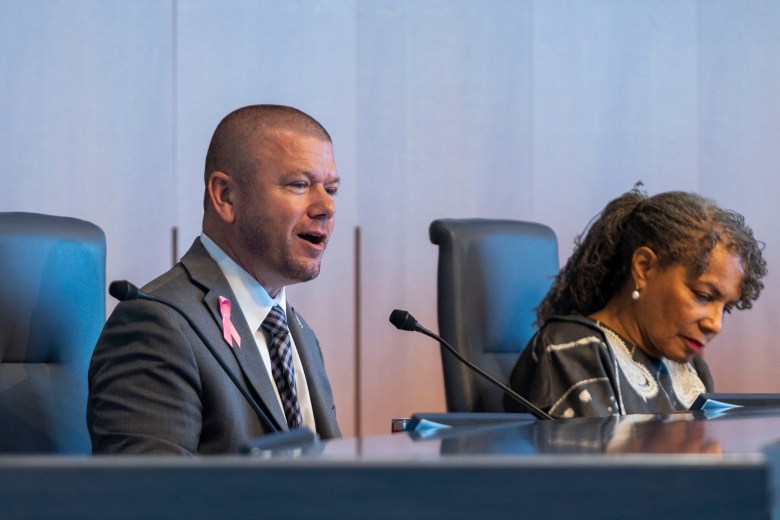 Fort Worth City Council member Charlie Lauersdorf speaks during a council meeting June 24, 2025, at City Hall. (Mary Abby Goss | Fort Worth Report)
Fort Worth City Council member Charlie Lauersdorf speaks during a council meeting June 24, 2025, at City Hall. (Mary Abby Goss | Fort Worth Report)
Hall, co-founder of Fort Worth ISD’s Young Women’s Leadership Academy, maintained that the city’s DEI programs are about doing what’s best for the community, not partisan politics.
Beck argued that the council’s vote on the resolution is more partisan than any other action or vote the council has taken.
“The vote that we are taking today did not happen and will not happen on June 24 or some date in the future — it happened back in November,” Beck said. “We are now being forced to make a decision, and that decision is to hurt people or to hurt people.”
Mayor Mattie Parker, who voted with the majority to delay the vote, said she plans to vote in August to comply with federal requirements, saying $277.1 million is too much to lose and affects too many employees.
“I want this dais to have respectful debate, and we hear each other. I think you’ve done that today. I hear your hearts,” Parker said. “I know this is really hard, and I think we can ultimately, hopefully come up with a result in August.”
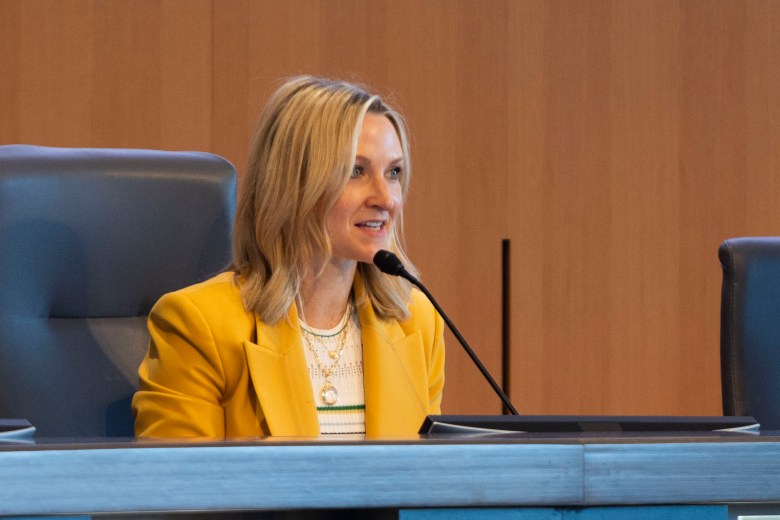 Mayor Mattie Parker speaks during a Fort Worth City Council meeting June 24, 2025, at City Hall. (Mary Abby Goss | Fort Worth Report)
Mayor Mattie Parker speaks during a Fort Worth City Council meeting June 24, 2025, at City Hall. (Mary Abby Goss | Fort Worth Report)
Several council members floated the idea of calling a special meeting in July, during the council’s summer break. Parker and council member Carlos Flores, a Democrat who council members elected as mayor pro tem that day, argued that it would be challenging to meet quorum in July, when council members have travel plans.
Nettles said it was “nasty and disrespectful” to look residents in their faces at the meeting and tell them they can’t vote on the resolution because they’re “busy.”
“I don’t give a damn if you’re busy in July or August,” Nettles said. “If we got something that we need to vote on, you need to be here.”
Peoples, a former chair of the Tarrant County Democratic Party, said she wanted to ensure that delaying the vote on the resolution would result in new information for council members to consider, so they don’t come back to vote on the same thing in August.
“I want to be sure that by extending this to Aug. 5, we are not just kicking the can down the road,” said Peoples, who opposed the resolution’s adoption. “The whole purpose of extending it is to give our staff time to go back and look at alternatives and look at what programs they could put together.”
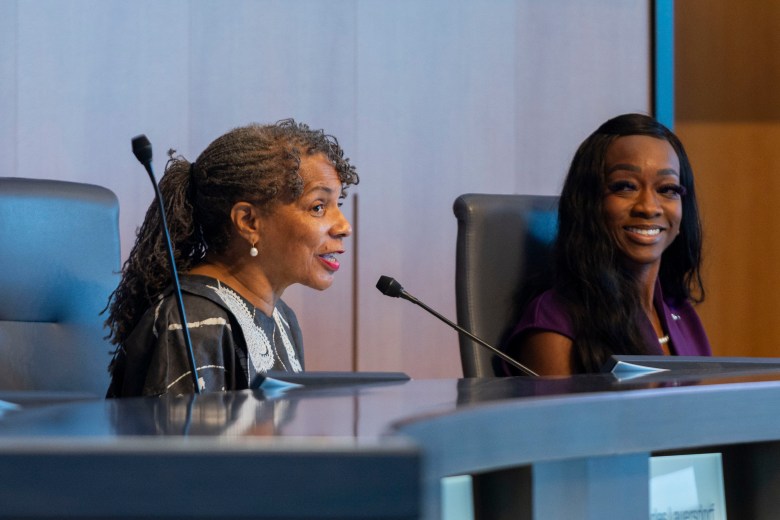 Fort Worth City Council member Deborah Peoples, left, speaks as council member Mia Hall watches during a council meeting June 24, 2025, at City Hall. (Mary Abby Goss | Fort Worth Report)
Fort Worth City Council member Deborah Peoples, left, speaks as council member Mia Hall watches during a council meeting June 24, 2025, at City Hall. (Mary Abby Goss | Fort Worth Report)
Chapa said staff will work toward creating the small-business program “as fast as possible” and bring council a presentation on the program Aug. 5. Nettles did not return the Fort Worth Report’s request for clarification on whether he still plans to push for a special meeting in July.
Residents speak against, in support of resolution
During the meeting, council members heard from a variety of community leaders, who expressed understanding that the council was facing a difficult decision but urged them to make the right choice.
Ericka Garza, president of the Hispanic chamber, and Michelle Green-Ford, president of the Black chamber, told council members it’s unfortunate they were forced to make a difficult decision. They both committed to working with city management to move forward strategically to comply with Trump’s orders while continuing to support the city’s minority-owned businesses.
“A strong economy isn’t about uniformity, it’s about unity and purpose and variety and contribution,” Garza said. “When we nurture the many voices in our business ecosystem, we reduce blank spots and unlock untapped potential. That’s what makes Fort Worth competitive.”
Pamela Young, executive director of the grassroots organization United Fort Worth, played a recording of Parker speaking when she presented a recognition declaring “Y’all means all” to celebrate Pride Month in Fort Worth.
During Parker’s June 10 recognition, she said, “Our community’s strength, hear my words, does lie in its diversity and unity, embracing people of all backgrounds, identities and experiences to build a more inclusive Fort Worth where every person is valued and free from discrimination.”
“Do you really believe that, Mayor Mattie Parker, or is that just for LGBTQ (Pride) Month and niceties?” Young asked. “Is it really for all people? All people who are going to be affected negatively by this removal?”
John Martinez, a leader of the Regional Hispanic Contractors Association, said that, if he was told a year ago that he would be supporting the end of the DEI programs, he wouldn’t believe it. Martinez signed up as undecided to speak on the resolution but, ultimately, he felt the federal funding was too valuable to lose, especially for minority communities that benefit from it.
“My trust is not in a department,” he said. “My trust is the men and women will work at the city of Fort Worth, that they’re going to make sure that this community is reflected in the business that we do and, more importantly, in the services that we provide.”
Council members will need to call a special meeting to vote on the resolution Aug. 5, as the scheduled meeting is a work session. Work session meetings allow council members to hear reports and have discussion without taking formal actions.
Editor’s note: This story was updated June 26, 2025, to correct the characterization of the Black chamber of commerce’s and the Hispanic chamber of commerce’s stances on the resolution. The chambers were not in direct opposition to the resolution.
Cecilia Lenzen and Drew Shaw are government accountability reporters for the Fort Worth Report. Contact them at cecilia.lenzen@fortworthreport.org and drew.shaw@fortworthreport.org.
At the Fort Worth Report, news decisions are made independently of our board members and financial supporters. Read more about our editorial independence policy here.
Related
Fort Worth Report is certified by the Journalism Trust Initiative for adhering to standards for ethical journalism.
Republish This Story
Republishing is free for noncommercial entities. Commercial entities are prohibited without a licensing agreement. Contact us for details.
